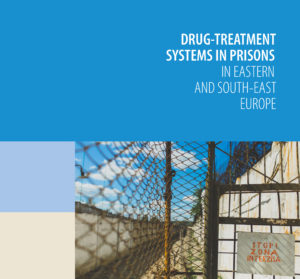 Council of Europe Co-operation Group to Combat Drug Abuse and Illicit Trafficking in Drugs published a new publication “Drug Treatment Systems in Prisons in Eastern and Southeastern Europe”. The publication sheds light into the situation of drug users among criminal justice populations and corresponding health care responses in ten countries in Eastern and Southeastern Europe: Albania, Bosnia-Herzegovina, Georgia, Kosovo, Macedonia, Moldova, Montenegro, Russia, Serbia, and Ukraine. AFEW‘s board member Vladimir Mendelevich is one of the contributors of the publication.
Council of Europe Co-operation Group to Combat Drug Abuse and Illicit Trafficking in Drugs published a new publication “Drug Treatment Systems in Prisons in Eastern and Southeastern Europe”. The publication sheds light into the situation of drug users among criminal justice populations and corresponding health care responses in ten countries in Eastern and Southeastern Europe: Albania, Bosnia-Herzegovina, Georgia, Kosovo, Macedonia, Moldova, Montenegro, Russia, Serbia, and Ukraine. AFEW‘s board member Vladimir Mendelevich is one of the contributors of the publication.
The research project on drug-treatment systems in prisons in Eastern and South-East Europe looks in detail into the situation of drug users among criminal justice populations and the corresponding health-care responses in nine countries in Eastern and South-East Europe – Albania, Bosnia-Herzegovina, Georgia, Moldova, Montenegro, Russia, Serbia, “the former Yugoslav Republic of Macedonia” and Ukraine – and Kosovo. It was conducted between 2013 and 2016, and is a first attempt to collect relevant data on drug use among prison populations and the related responses in the nine countries and Kosovo.
Although the places chosen are quite heterogeneous in size, structure, legislation, economy, culture and language, they are all in a process of economic, social and cultural transition. This has triggered reforms of some of their prison systems and policies but it has also led to financial and political instability and lack of leadership due to frequent changes in the prison systems’ top management.
The full publication can be downloaded here.



